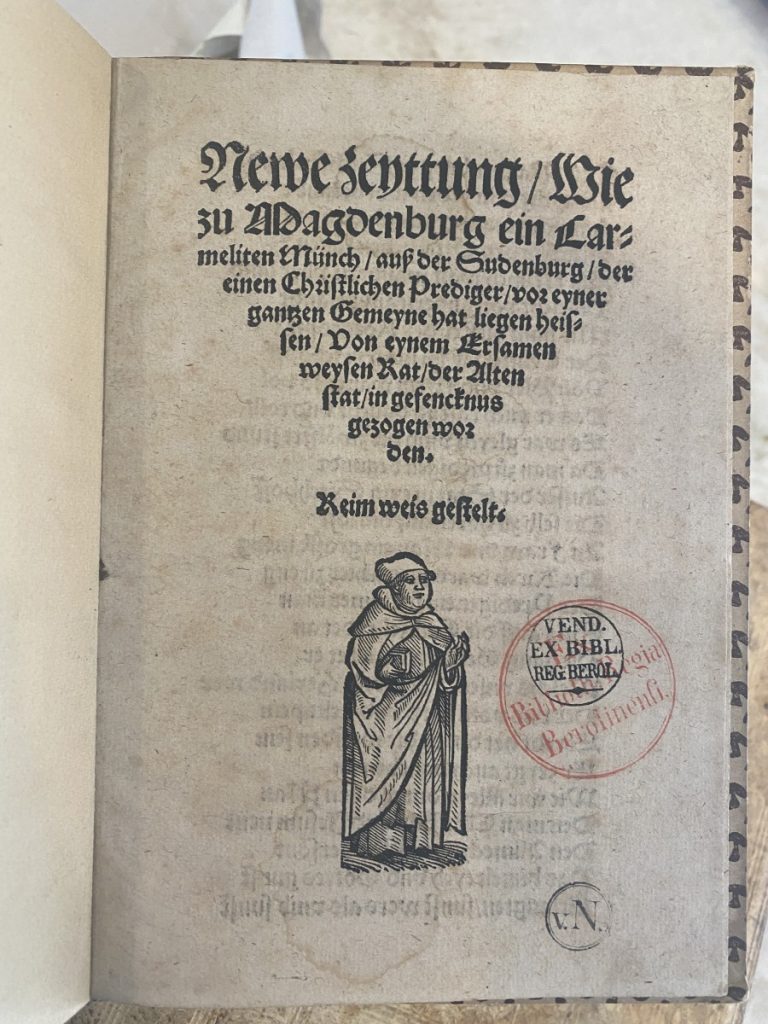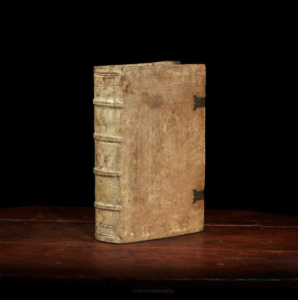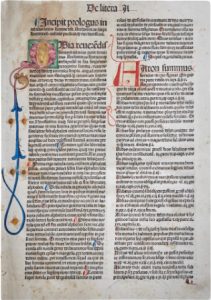 Pitts’ Head of Cataloging and Rare Book Cataloger, Armin Siedlecki, has seen thousands of books pass through his office and into the collection. What in particular has grabbed his attention this summer?
Pitts’ Head of Cataloging and Rare Book Cataloger, Armin Siedlecki, has seen thousands of books pass through his office and into the collection. What in particular has grabbed his attention this summer?
The first winner is The Dawn of Everything: a New History of Humanity by David Graeber and David Wengrow (Penguin Books 2022). Published after Graeber’s unexpected death in 2020, this book offers new insights about the origins of human society, the beginnings of inequality and social organization.  Graeber and Wengrow argue that the traditional social evolutionary model does not match the material evidence and that the two most common theories of the relationship between individual and community—Rousseau’s idea of the innocent individual corrupted by culture and society and Hume’s suggestion that the society is the results of attempts by individuals to protect themselves in a life that is nasty, brutish and short—are an overly simplified dichotomy of a much more complex anthropological history. The book is iconoclastic as it questions several sacrosanct assumptions of contemporary scholarship and should be read critically, but its challenges are convincingly argued and well supported. It is a stimulating read that compels the reader to reevaluate commonly held ideas and to develop new perspectives on the beginnings of human societies. Find this book at Emory or your local library!
Graeber and Wengrow argue that the traditional social evolutionary model does not match the material evidence and that the two most common theories of the relationship between individual and community—Rousseau’s idea of the innocent individual corrupted by culture and society and Hume’s suggestion that the society is the results of attempts by individuals to protect themselves in a life that is nasty, brutish and short—are an overly simplified dichotomy of a much more complex anthropological history. The book is iconoclastic as it questions several sacrosanct assumptions of contemporary scholarship and should be read critically, but its challenges are convincingly argued and well supported. It is a stimulating read that compels the reader to reevaluate commonly held ideas and to develop new perspectives on the beginnings of human societies. Find this book at Emory or your local library!
 Armin also recommends Hillary Mantel’s The Mirror and the Light (London: 4th Estate, 2021) which concludes her trilogy about the life of Thomas Cromwell. After describing Cromwell’s rise in Wolf Hall which ended with the beheading of Thomas Moore and his consolidation of power in Bring up the Bodies which ended with the beheading of Anne Boleyn, The Mirror and the Light concludes with Cromwell’s fall from royal favor and his own beheading. Mantel’s ability to describe historical figures as complex, life-like literary characters is undiminished in this third novel, which is meticulously researched and very entertaining to read. Find this book at Emory or your local library.
Armin also recommends Hillary Mantel’s The Mirror and the Light (London: 4th Estate, 2021) which concludes her trilogy about the life of Thomas Cromwell. After describing Cromwell’s rise in Wolf Hall which ended with the beheading of Thomas Moore and his consolidation of power in Bring up the Bodies which ended with the beheading of Anne Boleyn, The Mirror and the Light concludes with Cromwell’s fall from royal favor and his own beheading. Mantel’s ability to describe historical figures as complex, life-like literary characters is undiminished in this third novel, which is meticulously researched and very entertaining to read. Find this book at Emory or your local library.
Like what you see? Tune in next week for more suggestions from Pitts and Candler staff and faculty!




 So what was inside this well-traveled package? Armin Siedlecki, Head of Cataloging and Rare Book Cataloger, was thrilled to find and translate this 1542 polemical pamphlet recounting a scandal involving a Carmelite monk in the city of Magdeburg (Newe zeyttung, Wie zu Magdenburg ein Carmeliten Münch …). It tells the story of a drunk monk who attends a sermon preached outside the city by a righteous (Lutheran) pastor and who interrupts the preacher, accusing him of lying and misrepresenting Scripture. In response, the people rise up and begin to beat him, almost killing him, but the monk is taken away and brought before the city council and the mayor. The mayor calls for calm and instructs that the monk should be locked up to await the executioner and thus be placed under God’s justice rather than the mob’s anger. The story concludes with a warning to the residents of the city to keep their dignity, not to give in to anger, and to avoid the company of monks, whose trickery and deceit is more venomous than any basilisk. The pamphlet, whose title Newe Zeyttung can be freely translated as “breaking news,” may report a true story, albeit somewhat sensationalized. The city’s mayor is identified by name as Dr. Schiring, indicating Johann Scheiring, who served as mayor of Magdeburg in 1539 and 1542. The monk himself is only called Roth-Kopf (redhead), which may refer to Valentin Rothkopf, a Carmelite monk who was active in Saxony at the time and who was an outspoken opponent of the Lutheran Reformation. The pamphlet is an interesting testimony to how stories about local religious conflicts were passed on and appropriated for polemical, but also moralizing purposes.
So what was inside this well-traveled package? Armin Siedlecki, Head of Cataloging and Rare Book Cataloger, was thrilled to find and translate this 1542 polemical pamphlet recounting a scandal involving a Carmelite monk in the city of Magdeburg (Newe zeyttung, Wie zu Magdenburg ein Carmeliten Münch …). It tells the story of a drunk monk who attends a sermon preached outside the city by a righteous (Lutheran) pastor and who interrupts the preacher, accusing him of lying and misrepresenting Scripture. In response, the people rise up and begin to beat him, almost killing him, but the monk is taken away and brought before the city council and the mayor. The mayor calls for calm and instructs that the monk should be locked up to await the executioner and thus be placed under God’s justice rather than the mob’s anger. The story concludes with a warning to the residents of the city to keep their dignity, not to give in to anger, and to avoid the company of monks, whose trickery and deceit is more venomous than any basilisk. The pamphlet, whose title Newe Zeyttung can be freely translated as “breaking news,” may report a true story, albeit somewhat sensationalized. The city’s mayor is identified by name as Dr. Schiring, indicating Johann Scheiring, who served as mayor of Magdeburg in 1539 and 1542. The monk himself is only called Roth-Kopf (redhead), which may refer to Valentin Rothkopf, a Carmelite monk who was active in Saxony at the time and who was an outspoken opponent of the Lutheran Reformation. The pamphlet is an interesting testimony to how stories about local religious conflicts were passed on and appropriated for polemical, but also moralizing purposes. Pitts Theology Library recently acquired a number of incunabula at an online auction, raising the library’s holdings of these books printed in the 15th century to 115. Among these new acquisitions is the first part of a 1485 printing of the Summa Theologica by Antoninus of Florence (1389-1459), initially printed in 1477. Antoninus was a Dominican preacher who served as Archbishop of Florence from 1446 to 1459, occupying an important political office that occasionally put him at odds with the powerful Medici family. He was canonized in 1523 by Pope Adrian IV (who was both preceded and succeeded by a Medici Pope) and has sometimes been called a doctor of the church, although the title was never officially conferred on him. Antoninus’ Summa is considered his main theological achievement and is recognized as providing new impulses in moral theology at the dawn of the Renaissance. The pragmatism that pervades the work and which is informed by his public preaching in Florence has at its core a concern for the good of the civic community, which often stresses the social responsibility of the rich to the poor. The book, which is beautifully rubricated with initials and marginal illustrations in the medieval style, was previously held by the
Pitts Theology Library recently acquired a number of incunabula at an online auction, raising the library’s holdings of these books printed in the 15th century to 115. Among these new acquisitions is the first part of a 1485 printing of the Summa Theologica by Antoninus of Florence (1389-1459), initially printed in 1477. Antoninus was a Dominican preacher who served as Archbishop of Florence from 1446 to 1459, occupying an important political office that occasionally put him at odds with the powerful Medici family. He was canonized in 1523 by Pope Adrian IV (who was both preceded and succeeded by a Medici Pope) and has sometimes been called a doctor of the church, although the title was never officially conferred on him. Antoninus’ Summa is considered his main theological achievement and is recognized as providing new impulses in moral theology at the dawn of the Renaissance. The pragmatism that pervades the work and which is informed by his public preaching in Florence has at its core a concern for the good of the civic community, which often stresses the social responsibility of the rich to the poor. The book, which is beautifully rubricated with initials and marginal illustrations in the medieval style, was previously held by the  Lutheran Theological Seminary of Gettysburg, PA, and came from the collection of Dr. Jeremiah Zimmerman (1848-1937), a Lutheran pastor, educator, and book collector.
Lutheran Theological Seminary of Gettysburg, PA, and came from the collection of Dr. Jeremiah Zimmerman (1848-1937), a Lutheran pastor, educator, and book collector.